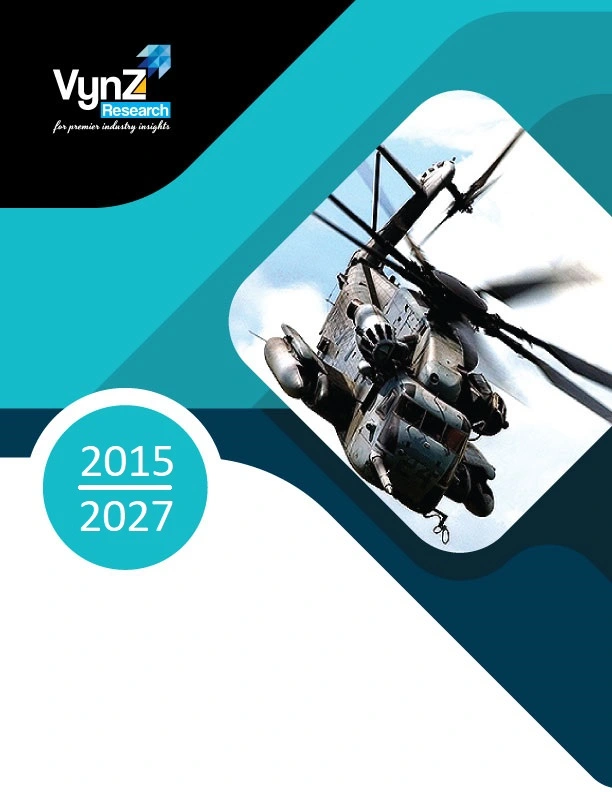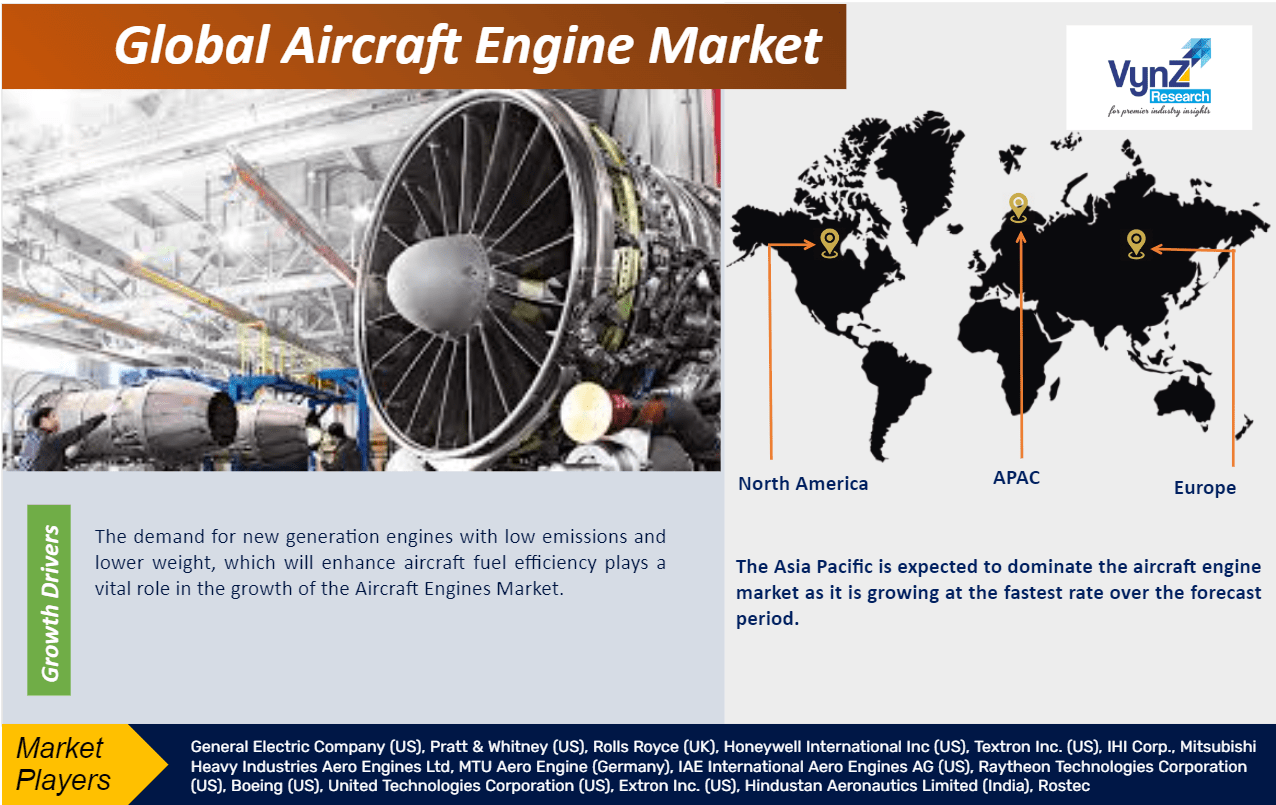| Status : Published | Published On : Mar, 2024 | Report Code : VRAD12025 | Industry : Aerospace and Defense | Available Format :

|
Page : 192 |

Global Aircraft Engine Market – Analysis and Forecast (2025-2030)
Industry Insight By Engine Type(Turbofan, Turboprop, Turboshaft and Piston), By Component (Compressor, Turbine, Gear Box, Exhaust, Nozzle and Fuel System), By Platform Type (Fixed Wing, Rotary Wing and Unmanned Aerial Vehicle - UAV), By Technology Type (Conventional and Hybrid), By End-User (Commercial, Military and General Aviation) and by Geography (North America, Europe, Asia-Pacific, Latin America, Middle East And Africa)
Industry Overview
The Global Aircraft Engine Market is projected to grow from USD 73.4 billion in 2023 to USD 112 billion in 2030 at a CAGR of 7.9% during the forecast period from 2025 to 2030.

Increase in the commercial aircraft operations are likely to drive the aircraft engine market in coming years. Pandemic of 2020 has a severe impact on the aviation industry as some of the Airliners faced a financial crisis due to deficiency in passenger demand. The market has been recovered after 2022. Replacement services plays important role in the growth of Aircraft Engine Market. Furthermore, the expansion plans of armed forces, airlines, aircraft and charter operators are expected to boost the growth of this market during the forecast period. Many companies are investing in research and development of new engine models utilizing the latest technologies, like additive manufacturing and composite technologies. Nevertheless, factors affecting the market's growth are the increasing concerns over the failure of aircraft engines during operation and delays in deliveries.
Market Segmentation
Insight by Engine Type
On the basis of engine type, the Aircraft Engine Market is segmented into turbofan, turboprop, turboshaft, and piston. Turbofan segment is likely to dominate the market with a higher CAGR during the forecast period due to its capability of flying at the higher altitude compared to other engines.
Insight by Component
The Aircraft Engine Market is segmented into compressor, turbine, gear box, exhaust, nozzle and fuel system based on the component type. Turbine segment dominated the market due to the increasing investment in research and development of fuel efficient aircraft turbines.
Insight by Platform Type
On the basis of platform type, Aircraft Engine Market is further classified into fixed wing, rotary wing and unmanned aerial vehicle (UAV). The UAV wing shall dominate the market because of their ability to reduce costs, enhance efficiency and improve safety.
Insight by Technology
Based on technology, Aircraft Engine Market is segmented into conventional and hybrid. The conventional segment shall dominate the market as it has significant share over the forecast period.
Insight by End-user Type
Based on the end-user type, the Aircraft Engine Market is segregated into commercial, military and general aviation. The commercial aviation segment dominated the market during the forecast period. Number of passengers are adopting airlines for their transportation which is the key factor driving the segment growth.
Global Aircraft Engine Market Report Coverage
|
Report Metric |
Details |
|
Historical Period |
2018 - 2023 |
|
Base Year Considered |
2024 |
|
Forecast Period |
2025 - 2030 |
|
Market Size in 2024 |
U.S.D. 73.4 Billion |
|
Revenue Forecast in 2030 |
U.S.D. 112 Billion |
|
Growth Rate |
7.9% |
|
Segments Covered in the Report |
By Engine Type, By Component, By Platform Type, By Technology Type and By End-User |
|
Report Scope |
Market Trends, Drivers, and Restraints; Revenue Estimation and Forecast; Segmentation Analysis; Impact of COVID-19; Companies’ Strategic Developments; Market Share Analysis of Key Players; Company Profiling |
|
Regions Covered in the Report |
North America, Europe, Asia-Pacific, Latin America, Middle East And Africa |
Industry Dynamics
Growth Drivers
The demand for new generation engines with low emissions and lower weight, which will enhance aircraft fuel efficiency plays a vital role in the growth of the Aircraft Engines Market. Rising aviation passenger traffic will add upon the expansion of the aircraft engine market over the forecast period. Various airlines are updating their fleets with the help of new aircraft to satisfy the demand for more seats in the air, which increases the need for new engines. Businesses are gradually using 3D printing technology in aircraft engines to save cost spent on fuel and materials.
Restraints
High maintenance cost of aircraft engines is the major constraint which is hampering the forecasted development of the aircraft engine market. Steps in the maintenance of aviation engines include cleaning and drying jet engine parts, examination of the interiors and exteriors, disassembling the engine, repairing and replacing any damaged parts and lastly reassembly and testing the engine. Multiple tools and innovative techniques, like robots are used to support skilled inspectors throughout the process. As a consequence, aircraft engines market is restrained by the high expense of engine maintenance.
Geographic Overview
-
North America
-
Europe
-
Asia Pacific (APAC)
-
Latin America
-
Middle East and Africa
The Asia Pacific is expected to dominate the aircraft engine market as it is growing at the fastest rate over the forecast period. The increase in demand for domestic air travel in emerging economies such as India and China is attributing the growth in the region. Furthermore, countries are increasing their investments to strengthen their aerial capabilities by replacing their outdated aircraft and buying cutting-edge aircraft. Following the fleet modernization plans shall probably increase the demand for light weight and fuel efficient motors in the coming years.
Competitive Insights
GE Aerospace is a manufacturer of engines. GE Aerospace's commercial engines are designed today to be 40% more fuel efficient compared to engines made in the 1970s. All GE Aerospace engines can operate on approved Sustainable Aviation Fuel (SAF) and have been successfully tested with 100% SAF that doesn’t require blending with conventional jet fuel.
Pratt & Whitney has the ideal engine model for virtually any application with a product portfolio spanning the entire business aviation market, . With more than one in three business jets powered by Pratt & Whitney engines, these companies are the industry standard for proven, dependable and trusted engines.
Key Players Covered in the Report
Major key players in the AIrcraft engine market include General Electric Company (US), Pratt & Whitney (US), Rolls Royce (UK), Honeywell International Inc (US), Textron Inc. (US), IHI Corp., Mitsubishi Heavy Industries Aero Engines Ltd, MTU Aero Engine (Germany), IAE International Aero Engines AG (US), Raytheon Technologies Corporation (US), Boeing (US), United Technologies Corporation (US), Extron Inc. (US), Hindustan Aeronautics Limited (India), Rostec
Recent developments by Key Players
GE Aerospace, an engine manufacturer has signed a Memorandum of Understanding (MoU) with Hindustan Aeronautics Limited (HAL) to manufacture fighter jet engines for the indegienous Light Combat Aircraft (LCA). The agreement includes the potential joint production of GE Aerospace’s F414 engines in India, and GE Aerospace shall continue to work with the U.S. government to receive the necessary export authorization for this. The effort is part of the Indian Air Force’s (IAF) LCA Mk2 programme.
US-based engine maker Pratt & Whitney (PW) has established a research & development (R&D) centre in Bengaluru 'to accelerate innovation and drive digital and business transformation' for its global operations.
The global Aircraft Engine Market report offers a comprehensive market segmentation analysis along with the estimation for the forecast period 2025–2030.
Segments Covered in the Report
- By Engine Type
- Turbofan
- Turboprop
- Turboshaft
- Piston
- By Component
- Compressor
- Turbine
- Gear Box
- Exhaust
- Nozzle
- Fuel System
- By Platform Type
- Fixed wing
- Rotary wing
- Unmanned Aerial Vehicle (UAV)
- By End-user Type
- Commercial
- Military
- General Aviation
Region Covered in the Report
- North America
- U.S.
- Canada
- Mexico
- Europe
- Germany
- U.K.
- France
- Italy
- Spain
- Russia
- Rest of Europe
- Asia-Pacific (APAC)
- China
- Japan
- South Korea
- India
- Australia
- Rest of APAC
- Latin America
- Brazil
- Argentina
- Rest of South America
- Middle East and Africa
- Turkey
- UAE
- Saudi Arabia
- South Africa
- Rest of MEA
.png)
Source: VynZ Research
.png)
Source: VynZ Research
Frequently Asked Questions
Purchase Options
Latest Report
Research Methodology
- Desk Research / Pilot Interviews
- Build Market Size Model
- Research and Analysis
- Final Deliverabvle
Connect With Our Sales Team
- Toll-Free: 1 888 253 3960
- Phone: +91 9960 288 381
- Email: enquiry@vynzresearch.com
Aircraft Engine Market
